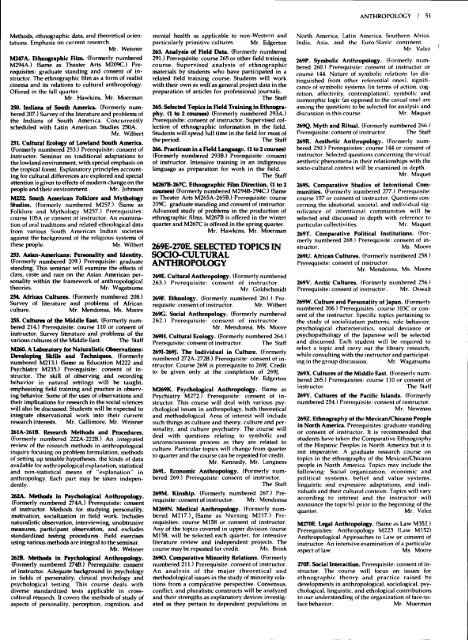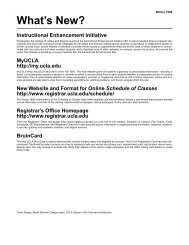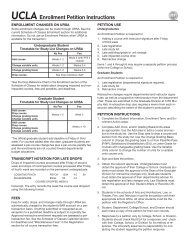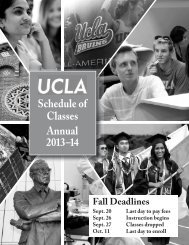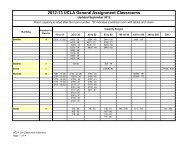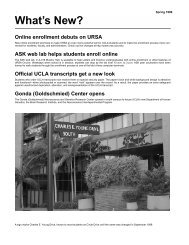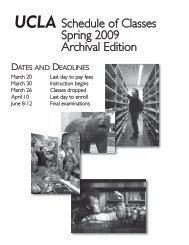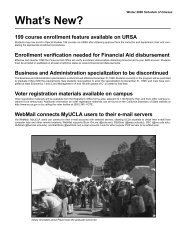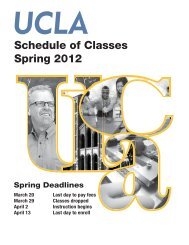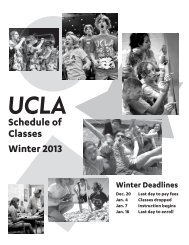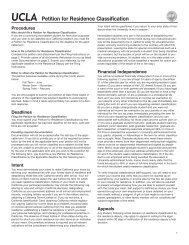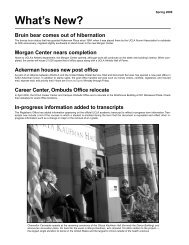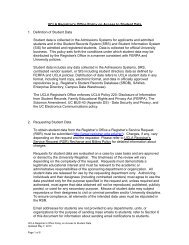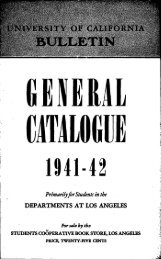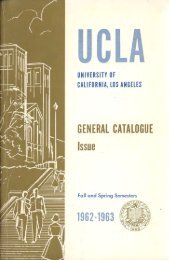UCLA Graduate Catalog 1980-81 - Registrar - UCLA
UCLA Graduate Catalog 1980-81 - Registrar - UCLA
UCLA Graduate Catalog 1980-81 - Registrar - UCLA
You also want an ePaper? Increase the reach of your titles
YUMPU automatically turns print PDFs into web optimized ePapers that Google loves.
ANTHROPOLOGY / 51<br />
Methods, ethnographic data , and theoretical orien- mental health as applicable to non-Western and North America, Latin America, Southern Africa,<br />
tations. Emphasis on current research.<br />
Mr. Weisner<br />
particularly primitive cultures. Mr. Edgerton<br />
263. Analysis of Field Data . (Formerly numbered<br />
India, Asia, and the Euro-Slavic continent.<br />
Mr. Velez<br />
M247A. Ethnographic Film. (Formerly numbered<br />
M294A.) (Same as Theater Arts M209C.) Prerequisites:<br />
graduate standing and consent of instructor<br />
. The ethnographic film as a form of realist<br />
cinema and its relations to cultural anthropology.<br />
Offered in the fall quarter.<br />
Mr. Hawkins , Mr. Moerman<br />
291.) Prerequisite : course 265 or other field training<br />
course . Supervised analysis of ethnographic<br />
materials by students who have participated in a<br />
related field training course . Students will work<br />
with their own as well as general project data in the<br />
preparation of articles for professional journals.<br />
The Staff<br />
269P. Symbolic Anthropology . (Formerly numbered<br />
260.) Prerequisite: consent of instructor or<br />
course 144. Nature of symbolic relations (as distinguished<br />
from other referential ones), significance<br />
of symbolic systems (in terms of action, cognition<br />
, affectivity, contemplation), symbolic and<br />
isomorphic logic (as opposed to the casual one) are<br />
250. Indians of South America . (Formerly num- 265. Selected Topics in Field Training in Ethnogra- among the questions to be selected for analysis and<br />
bered 207.) Survey of the literature and problems of phy. (1 to 2 courses ) (Formerly numbered 293A.) discussion in this course. Mr. Maquet<br />
the Indians of South America . Concurrently<br />
scheduled with Latin American Studies 250A.<br />
Mr. Wilbert<br />
Prerequisite : consent of instructor . Supervised collection<br />
of ethnographic information in the field.<br />
Students will spend full time in the field for most of<br />
269Q. Myth and Ritual . (Formerly numbered 266.)<br />
Prerequisite: consent of instructor. The Staff<br />
251. Cultural Ecology of Lowland South America.<br />
(Formerly numbered 253.) Prerequisite: consent of<br />
instructor . Seminar on traditional adaptations to<br />
the lowland environment , with special emphasis on<br />
the tropical forest . Explanatory principles accounting<br />
for cultural differences are explored and special<br />
the period. The Staff<br />
266. Practicum in a Field Language . (1 to 2 courses)<br />
(Formerly numbered 293B.) Prerequisite : consent<br />
of instructor . Intensive training in an indigenous<br />
language as preparation for work in the field.<br />
The Staff<br />
269R. Aesthetic Anthropology . (Formerly numbered<br />
250.) Prerequisites: course 144 or consent of<br />
instructor. Selected questions concerning the visual<br />
aesthetic phenomena in their relationships with the<br />
socio-cultural context will be examined in depth.<br />
Mr. Maquet<br />
attention is given to effects of modern change on the<br />
people and their environment . Mr. Johnson<br />
M252. South American Folldore and Mythology<br />
Studies . (Formerly numbered M257.) (Same as<br />
Folklore and Mythology M257.) Prerequisites:<br />
M2678 -267C. Ethnographic Film Direction. (1 to 2<br />
courses) (Formerly numbered M294B-294C.) (Same<br />
as Theater Arts M265A -265B.) Prerequisite : course<br />
209C, graduate standing and consent of instructor.<br />
Advanced study of problems in the production of<br />
2695. Comparative Studies of Intentional Communities<br />
. (Formerly numbered 277.) Prerequisite:<br />
course 157 or consent of instructor. Questions concerning<br />
the ideational, societal, and individual significance<br />
of intentional communities will be<br />
course 105A or consent of instructor. An examina- ethnographic films . M267B is offered in the winter selected and discussed in depth with reference to<br />
tion of oral traditions and related ethnological data quarter and M267C is offered in the spring quarter. particular collectivities. Mr. Maquet<br />
from various South American Indian societies<br />
against the background of the religious systems of<br />
these people. Mr. Wilbert<br />
253. Asian -Americans : Personality and Identity.<br />
(Formerly numbered 209.) Prerequisite : graduate<br />
standing . This seminar will examine the effects of<br />
class, caste and race on the Asian American personality<br />
within the framework of anthropological<br />
theories . Mr. Wagatsuma<br />
Mr. Hawkins , Mr. Moerman<br />
269E-270E. SELECTED TOPICS IN<br />
SOCIO-CULTURAL<br />
ANTHROPOLOGY<br />
269E. Cultural Anthropology . (Formerly numbered<br />
263.) Prerequisite: consent of instructor.<br />
Mr. Goldschmidt<br />
269T. Comparative Political Institutions. (Formerly<br />
numbered 268.) Prerequisite: consent of instructor.<br />
Ms. Moore<br />
269U. African Cultures . (Formerly numbered 258.)<br />
Prerequisite: consent of instructor.<br />
Mr. Mendonsa, Ms. Moore<br />
269V. Arctic Cultures. (Formerly numbered 256.)<br />
Prerequisite: consent of instructor. Mr. Oswalt<br />
254. African Cultures . (Formerly numbered 208.)<br />
Survey of literature and problems of African<br />
culture . Mr. Mendonsa , Ms. Moore<br />
255. Cultures of the Middle East. (Formerly numbered<br />
214.) Prerequisite : course 110 or consent of<br />
instructor . Survey literature and problems of the<br />
various cultures of the Middle East . The Staff<br />
M260. A Laboratory for Naturalistic Observations:<br />
Developing Skills and Techniques . (Formerly<br />
numbered M213.) (Same as Education M222 and<br />
Psychiatry M235 .) Prerequisite : consent of instructor<br />
. The skill of observing and recording<br />
behavior in natural settings will be taught,<br />
emphasizing field training and practice in observ-<br />
269F. Ethnology . (Formerly numbered 261.) Prerequisite:<br />
consent of instructor. Mr. Wilbert<br />
269G. Social Anthropology . (Formerly numbered<br />
262.) Prerequisite: consent of instructor.<br />
Mr. Mendonsa, Ms. Moore<br />
269H. Cultural Ecology . (Formerly numbered 264.)<br />
Prerequisite: consent of instructor. The Staff<br />
2691-269J. The Individual in Culture . (Formerly<br />
numbered 272A-272B.) Prerequisite: consent of instructor.<br />
Course 2691 is prerequisite to 269J. Credit<br />
to be given only at the completion of 269J.<br />
Mr. Edgerton<br />
M269K. Psychological Anthropology . (Same as<br />
269W. Culture and Personality of Japan. (Formerly<br />
numbered 206.) Prerequisites: course 103C or consent<br />
of the instructor. Specific topics pertaining to<br />
the study of socialization patterns, role behavior,<br />
psychological characteristics, social deviance or<br />
psychopathology of the Japanese will be selected<br />
and discussed. Each student will be required to<br />
select a topic and carry out the library research,<br />
while consulting with the instructor and participating<br />
in the group discussion. Mr. Wagatsuma<br />
269X. Cultures of the Middle East. (Formerly numbered<br />
265.) Prerequisites: course 110 or consent of<br />
instructor. The Staff<br />
ing behavior . Some of the uses of observations and Psychiatry M272.) Prerequisite: consent of in- 269Y. Cultures of the Pacific Islands. (Formerly<br />
their implications for research in the social sciences structor. This course will deal with various psy- numbered 254.) Prerequisite: consent of instructor.<br />
will also be discussed . Students will be expected to chological issues in anthropology, both theoretical<br />
Mr. Newman<br />
integrate observational work into their current<br />
research interests . Mr. Gallimore , Mr. Weisner<br />
261A-2618. Research Methods and Procedures.<br />
(Formerly numbered 222A-222B.) An integrated<br />
review of the research methods in anthropological<br />
inquiry focusing on problem formulation , methods<br />
of setting up testable hypotheses, the kinds of data<br />
available for anthropological explanation , statistical<br />
and methodological. Area of interest will include<br />
such things as culture and theory, culture and personality,<br />
and culture psychiatry. The course will<br />
deal with questions relating to symbolic and<br />
unconsciousness process as they are related to<br />
culture. Particular topics will change from quarter<br />
to quarter and the course can be repeated for credit.<br />
Mr. Kennedy, Mr. Langness<br />
269Z. Ethnography of the Mexican /Chicano People<br />
in North America. Prerequisites: graduate standing<br />
or consent of instructor. It is recommended that<br />
students have taken the Comparative Ethnography<br />
of the Hispanic Peoples in North America but it is<br />
not imperative. A graduate research course on<br />
topics in the ethnography of the Mexican/Chicano<br />
people in North America. Topics may include the<br />
and non-statistical means of "explanation" in 269L. Economic Anthropology . (Formerly num- following: Social organization, economic and<br />
anthropology . Each part may be taken indepenbered 269.) Prerequisite : consent of instructor. political systems, belief and value systems,<br />
dently.<br />
The Staff linguistic and expressive adaptations, and indi-<br />
262A. Methods in Psychological Anthropology.<br />
(Formerly numbered 274A.) Prerequisite : consent<br />
of instructor . Methods for studying personality,<br />
motivation , socialization in field work . Includes<br />
269M. Kinship . (Formerly numbered 267.) Prerequisite<br />
: consent of instructor . Mr. Mendonsa<br />
M269N . Medical Anthropology . (Formerly numbered<br />
M217.), (Same as Nursing M217.) Previduals<br />
and their cultural contexts. Topics will vary<br />
according to interest and the instructor will<br />
announce the topic(s) prior to the beginning of the<br />
quarter. Mr. Velez<br />
naturalistic observation , interviewing , unobtrusive requisites: course M158 or consent of instructor.<br />
measures, participant observation, and excludes Any of the topics covered in upper division course<br />
standardized testing procedures. Field exercises M158, will be selected each quarter, for intensive<br />
using various methods are integral to the seminar. literature review and independent projects. The<br />
Mr. Weisner course may be repeated for credit. Ms. Brink<br />
M270E. Legal Anthropology . (Same as Law M352.)<br />
Prerequisites: Anthropology M223 (Law M152)<br />
Anthropological Approaches to Law or consent of<br />
instructor. An intensive examination of a particular<br />
aspect of law. Ms. Moore<br />
2628. Methods in Psychological Anthropology. 2690 . Comparative Minority Relations . (Formerly<br />
(Formerly numbered 2748 .) Prerequisite : consent numbered 211.) Prerequisite : consent of instructor. 270F. Social Interaction . Prerequisite: consent of in-<br />
of instructor. Adequate background in psychology An analysis of the major theoretical and structor. The course will focus on issues for<br />
in fields of personality, clinical psychology and methodological issues in the study of minority rela- ethnographic theory and practice raised by<br />
psychological testing. This course deals with tions from a comparative perspective . Consensus, developments in anthropological, sociological, psy-<br />
diverse standardized tests applicable in cross- conflict, and pluralistic constructs will be analyzed chological, linguistic , and ethological contributions<br />
cultural research. It covers the methods of study of and their strengths as explanatory devices investig- to our understanding of the organization of face-to-<br />
aspects of personality, perception, cognition, and ated as they pertain to dependent populations in face behavior. Mr. Moerman


